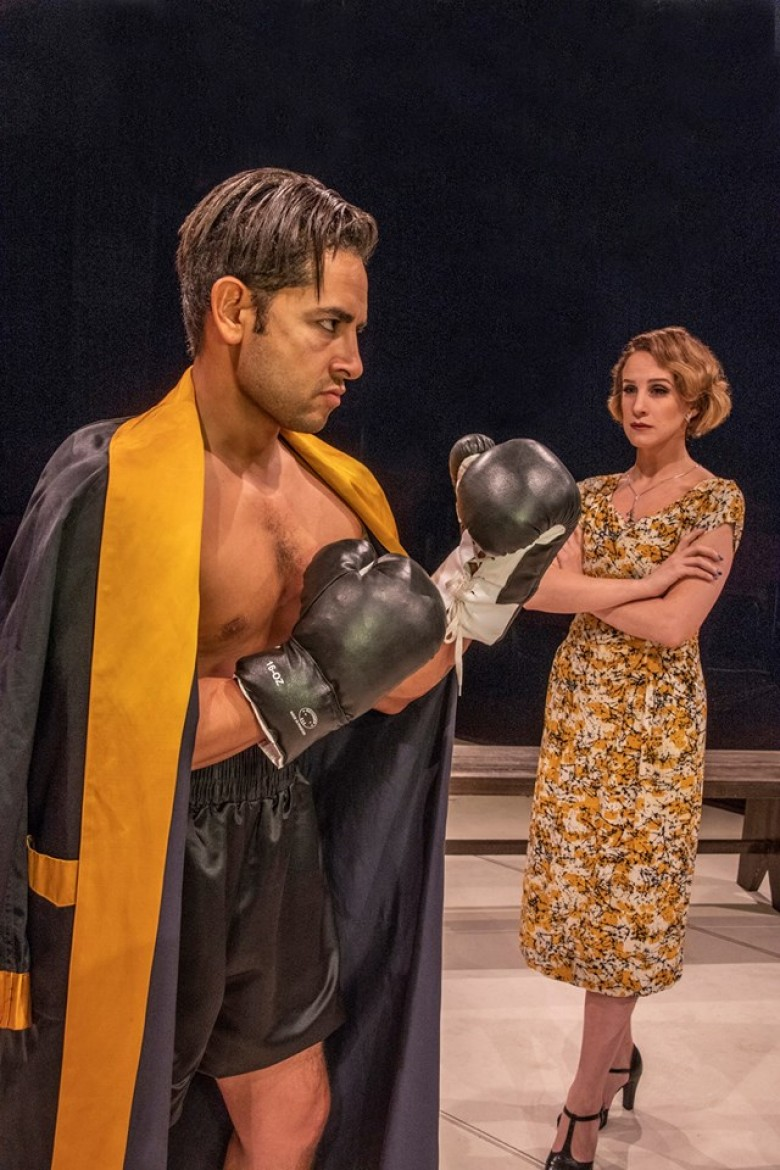“For what shall it profit a man if he shall gain the whole world yet suffer the loss of his soul?” These biblical words from Mark 8:36, while not spoken in the play, are at the heart of Clifford Odets’ 1937 classic, Golden Boy, a tragic treatise on the moral dilemma between the overweening desire for fortune versus following one’s heart and true nature. Such is the quandary faced by Joe Bonaparte, a struggling, talented young violinist who longs to be rich, to experience more of life, and “be somebody.” He is torn between the money and glamour of being a fighter and continuing his pursuit of the music that he loves.
Set in the world of depression-era boxing, Golden Boy is given a splendid treatment by Director Fortunato Pezzimenti at Irish Classical Theatre Company. This three-act play is riveting from start to finish. Every element of the production contributes to a seamless and gripping evening of theater. Scenes change in dim blue lighting (designed by Brian Cavanaugh) while cast members take their places and quietly begin the next scene, creating a feeling of continuity as one scene flows into the next, while mood music (designed by Tom Makar) sets the tone. Nothing detracts or distracts from the main event, the struggles of Joe, Lorna and Tom, as they strive to claim their places in an unforgiving world.
The callous, lowbrow sphere of 1930s boxing is as much a character in the play as are the people who inhabit it. Boxing is a blood sport, where "pieces" of fighters are up for sale, greed is the order of the day, and the men in the ring take incredible punishment to line the pockets of promotors and maybe, maybe find glory. Odets’ hard-nosed lyrical language provides a window into this tough society, as his characters confront and parry with each other in pursuit of their dreams.
Anthony Alcocer is Joe, the brash young man who fights himself more vigorously than he fights his opponents. Mr. Alcocer gives a layered performance, transforming from youthful charm and the innocent arrogance of the untested and untried into a very angry, egotistical man, full of loathing for himself and his sport. His trainer tells him, “Your heart ain’t in fighting. Your hate is…find something to love.” When faced with the reality of what he has done to himself, his misery and naïve belief that he can somehow fix it all is heartbreaking to watch.
Cassie Cameron is a wonder as Lorna Moon, the mistress of fight promotor Tom Moody. Ms. Cameron exudes the tough-broad image—hard-boiled, seen-it-all—who is willing to settle for being wanted by the mediocre promotor because that’s the best a girl like her can hope for. She is totally believable with her Jersey accent and sharp tongue, the wise-cracking blonde who knows what’s what. When that façade cracks, Ms. Cameron exposes the vulnerability beneath. She is superb.
Christian Brandjes is Tom Moody. He plays this part very well, the sort of likeable-at-first, greedy little man in over his head, desperate to believe in his own goodness while he sells what little honor he still possesses to the thug, Fuseli.
Eric Rawski plays Fuseli with a quiet menace that he backs up with violence when thwarted. Also, in the supporting cast, David Lundy is the kind trainer, Tokio. Adam Yellen is an amusing diversion as Joe’s twitchy brother-in-law Siggie, who has some very funny go-rounds with his wife, Anna (Arin Lee Dandes), who effortlessly keeps up with him in their sparring. Rolando Martin Gomez is Joe’s father, and does not seem to really inhabit the role, at times not quite reaching the depth of feeling required. Jeffrey Coyle overplays a bit as Roxy, one of the sleazy partner’s in the Bonaparte syndicate. Steve Jakiel, Gabriel Robere, David C. Mitchell, and Gerry Maher round out this fine cast.
I saw this three-hour, three-act play on the night of Curtain Up!. The sold-out audience was glued to their seats throughout, the party outside notwithstanding. No one left Golden Boy, a testament to the brilliance and timelessness of the script and the high quality of the production. Kudos to all.

